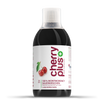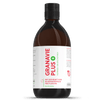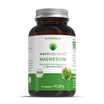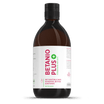

Everyone knows how important it is to ensure an adequate intake of iron or vitamin C – but what about sulfur ? For most people, sulfur remains largely unknown, yet it's one of the most abundant minerals in our bodies and fulfills numerous vital functions. Despite this, its importance is often underestimated. In this article, we'll show you why MSM , an organic form of sulfur, is far more than just a passing fad. Learn how MSM can affect your body.
Here you will learn...
The most important points in brief
MSM is an organic sulfur compound that occurs naturally in protein-rich foods and some vegetables.
Sulfur is the fourth most abundant mineral in the human body.
MSM has been investigated in numerous studies regarding its potential effects on oxidative stress, inflammation, the immune system, joint problems, and recovery after physical exertion.
What is MSM (methylsulfonylmethane)?
MSM is the abbreviation for methylsulfonylmethane – a naturally occurring sulfur compound found in all living organisms. After calcium, phosphorus, and potassium, sulfur is actually the fourth most abundant mineral in the human body.
Particularly high concentrations of sulfur are found in hair, nails, skin, tendons and cartilage.
Accordingly, it fulfills the following tasks in our body:
- As a component of important amino acids, enzymes and hormones
- Contributes to the structure and function of connective tissue, muscles and bones (1).

Contrary to what one might assume from the word "sulfur," MSM is not the yellow, pungent-smelling element from chemistry class. Rather, it refers to organic sulfur compounds that occur naturally in protein-rich foods such as meat, fish, hard cheese, and milk, as well as in vegetables such as broccoli, garlic, and potatoes (2).
Why MSM is so important for your body
Although a direct deficiency of sulfur in humans has not yet been clearly proven, there are indications that in certain situations the body does not have enough sulfur available to perform all its important functions.
A sulfur deficiency can occur especially when:
- Insufficient protein intake can occur, for example, in old age, with restrictive diets, or with a purely plant-based diet without careful planning. In such cases, the body often lacks important sulfur-containing amino acids such as methionine and cysteine.
- The need for sulfur is increased : for example, in cases of chronic inflammation, regular intake of certain medications, or severe physical or mental stress.
- The liver is under severe strain : For example, due to environmental toxins, alcohol, or long-term use of medication (3)

In such situations, MSM can be a well-tolerated way to specifically support sulfur intake. According to studies, its intake is considered safe and well-tolerated (4, 5).
In recent years, the effects of MSM have received increasing attention in scientific studies. Numerous potential mechanisms of action and effects on the human body have been investigated. Below you will find an overview of the most exciting findings.
Antioxidant effect: Can MSM protect cells?
Our bodies have their own protective mechanisms to keep so-called free radicals in balance. These oxygen compounds are produced, for example, by stress, illness, an unbalanced diet, or intense physical exertion. When they become excessive, it is called oxidative stress – a condition in which cells can be damaged and inflammation can be promoted.
To prevent this from happening in the first place, the body produces its own antioxidants, such as superoxide dismutase and glutathione peroxidase, which neutralize free radicals. Studies show that MSM can effectively support this natural protective mechanism.
MSM helps maintain the balance between free radicals and the body's own defense substances. This is due, among other things, to its influence on certain cellular control mechanisms, so-called transcription factors such as NF-κB, which are involved in the regulation of inflammatory processes (4).

MSM to support the immune system
By helping to reduce oxidative stress, MSM not only protects cells but also plays a role in the immune system . A weakened immune system is often the result of internal inflammation or an imbalance of free radicals (3).
MSM appears to have a positive effect on glutathione , one of the body's most important antioxidants, in several ways. A stable glutathione level is crucial for a strong and responsive immune system.
Glutathione supports the immune system on several levels:
- T-lymphocytes : Glutathione promotes the number and function of these white blood cells, one of the most important "defense cells" against pathogens.
- Cytokines : It helps to maintain normal levels of these messenger substances, which coordinate the immune system and enable a targeted immune response.
- Mast cells : These immune cells are located along the respiratory tract and are important “guardians” of the body, as pathogens often enter the body via the respiratory tract (6)

MSM's effects on joint pain: What research says
Another area where MSM has been scientifically studied is joint health . Many people experience limitations in this area over the course of their lives – be it due to age-related wear and tear, overuse from sports, or inflammatory processes.
In fact, joint problems are among the most common health problems in Germany: More than half the population is affected (7). In addition, about 17% of people suffer from osteoarthritis (8).
Scientific studies have shown that MSM has great potential to support joint health.
It can help to influence the following aspects of osteoarthritis:
- Pains
- Stiffness
- Swelling
- Joint mobility (5)

MSM can play a significant role not only in serious joint diseases but also in milder conditions . Researchers from a 2023 clinical study emphasize the importance of early treatment. Acute or seemingly harmless symptoms can become chronic over time and increase the risk of more serious conditions such as osteoarthritis (1).
MSM's effects on athletes: Faster recovery after training?
Although exercise is generally healthy and has numerous positive effects on the body, intensive training initially represents a significant strain for ambitious athletes. During exercise, tiny tears, known as microtears, occur in the muscles. At the same time, pro-inflammatory processes are activated, which, among other things, cause muscle soreness . This is a natural adaptation mechanism that allows the body to become accustomed to the strain (9).
MSM (methylsulfonylmethane) could potentially be helpful here as well. While the body of research in this area is still limited, initial studies show promising results. These studies investigated whether regular MSM intake can promote recovery after intense training and reduce muscle damage.
The potential effects of MSM on sports
- Reduction of pro-inflammatory messengers: MSM can reduce the release of pro-inflammatory substances after exercise. This contributes to reducing muscle soreness and accelerating recovery (10).
- Another study showed that MSM can positively influence certain blood values , such as creatine kinase, bilirubin, and total antioxidant capacity, during longer running sessions. These changes suggest a protective effect against exercise-induced muscle damage (11).

Here's how to incorporate more MSM into your daily life
Whether through diet or targeted supplementation: there are many ways to increase your body's MSM intake – especially if your needs are elevated. This can be the case, for example, with chronic stress, intense physical exertion, or a low-protein diet.
- Sulfur-rich vegetables : Broccoli, garlic, onions, and cabbage are particularly rich in sulfur. For best results, enjoy them raw or only lightly cooked.
- Protein-rich foods : Meat, fish, eggs, and dairy products provide important sulfur-containing amino acids. Plant-based alternatives include lentils, chickpeas, and rolled oats.
- Sulfur-rich herbs : Chives, leeks and wild garlic not only provide flavor, but also valuable sulfur.
- Avoid highly processed products : Cooking fresh is worthwhile, because ready-made products often contain hardly any bioactive sulfur compounds.
- Use MSM as a dietary supplement : Taking MSM in powder or capsule form is a practical and easy way to specifically support your sulfur needs. Studies confirm that MSM is generally safe and well-tolerated – the important thing is to choose high-quality products.
Our recommendation
Conclusion
MSM is an organic sulfur compound that plays an important role in many areas of the human body, such as supporting joint health, the immune system, and antioxidant defense. Targeted supplementation can be particularly beneficial in situations where sulfur requirements are increased, for example, with a low-protein diet, long-term medication use, or chronic stress. MSM shows particularly promising results in relation to maintaining the immune system, joint pain, and recovery after physical exertion.
Our expert
What is MSM?
MSM (methylsulfonylmethane) is an organic sulfur compound that occurs naturally in many foods and in the human body.
What is MSM taken for?
MSM is primarily used to support joint health, promote recovery after exercise, and reduce inflammation and oxidative stress.
How does MSM work in the body?
MSM provides sulfur, an essential element for the formation of amino acids, enzymes, hormones and connective tissue.
Are there any scientific studies on MSM?
Yes, there are numerous studies that deal with the effects of MSM on joint problems, inflammatory processes, the immune system and athletic recovery.
Can MSM help with osteoarthritis?
Studies suggest that MSM may have a supportive effect on osteoarthritis, particularly regarding pain, stiffness, and swelling.
What side effects can MSM have?
MSM is generally well tolerated. In rare cases, gastrointestinal discomfort such as bloating or nausea may occur, especially with excessively high doses or in individuals with sensitive stomachs.
References for further reading:
- Toguchi A, Noguchi N, Kanno T, Yamada A. Methylsulfonylmethane Improves Knee Quality of Life in Participants with Mild Knee Pain: A Randomized, Double-Blind, Placebo-Controlled Trial. Nutrients 2023; 15(13).
- Biesalski HK, Grimm P, Nowitzki-Grimm S, eds. Pocket Atlas of Nutrition. 8th, completely revised edition: Thieme; 2020.
- Nimni ME, Han B, Cordoba F. Are we getting enough sulfur in our diet? Nutr Metab (Lond) 2007; 4:24.
- Butawan M, Benjamin RL, Bloomer RJ. Methylsulfonylmethane: Applications and Safety of a Novel Dietary Supplement. Nutrients 2017; 9(3).
- Debbi EM, Agar G, Fichman G, Ziv YB, Kardosh R, Halperin N, et al. Efficacy of methylsulfonylmethane supplementation on osteoarthritis of the knee: a randomized controlled study. BMC Complement Altern Med 2011; 11:50.
- Klihada F. Relationship between Glutathione and the Immune System. Oxidants and Antioxidants in Medical Science, 2023; 12(1):1–2.
- Fuchs J, Prütz F. Prevalence of joint pain in Germany. Journal of Health Monitoring 2017; 2(3):66–71. Available at: https://edoc.rki.de/handle/176904/278
- Robert Koch Institute. Osteoarthritis: Prevalence (from age 18): Federal Health Reporting; 2024. Available at: https://gbe.rki.de.
- Mansoori S, Dini A, Chai SC. Effects of tart cherry and its metabolites on aging and inflammatory conditions: Efficacy and possible mechanisms. Aging Res Rev 2021; 66:101254.
- van der Merwe M, Bloomer RJ. The Influence of Methylsulfonylmethane on Inflammation-Associated Cytokine Release before and following Strenuous Exercise. J Sports Med (Hindawi Publ Corp) 2016; 2016:7498359.
- Barmaki S, Bohlooli S, Khoshkhahesh F, Nakhostin-Roohi B. Effect of methylsulfonylmethane supplementation on exercise - Induced muscle damage and total antioxidant capacity. J Sports Med Phys Fitness 2012; 52(2):170–4.



![Zinc Capsules [Zinc Bisglycinate]](http://cellavent.de/cdn/shop/files/CH_essentials-zink-kapseln-Produktbilder_2025.png?v=1770314562&width=104)











![MSM capsules [methylsulfonylmethane]](http://cellavent.de/cdn/shop/files/CH_essentials-MSM-kapseln-Produktbilder_2025_420x420.png?v=1770314779)